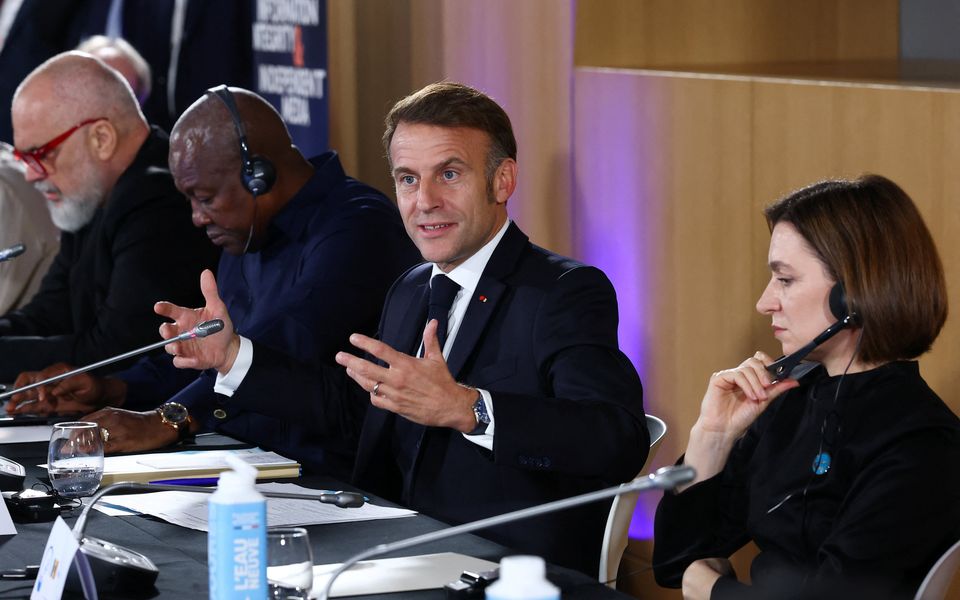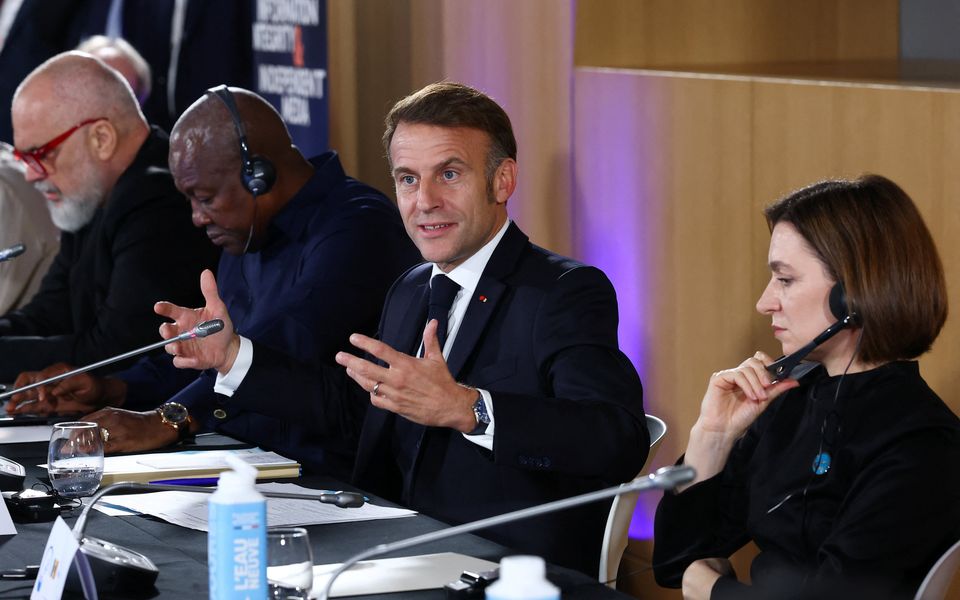
French President Emmanuel Macron gestures next to Ghana’s President John Dramani Mahama and Moldova’s President Maia Sandu during the Paris Peace Forum at the Palais de Chaillot in Paris, October 29. [Gonzalo Fuentes/EPA]
Last week, the 8th Paris Peace Forum was held in France. It was attended mainly by leaders from the so-called “Global South,” the prime ministers of Armenia and Albania, the president of Kosovo, ministers from European countries and of course several French officials, most notably President Emmanuel Macron. A common observation among attendees was that the post-war international system, as we have known it for 80 years, has come to an end. In fact, most officials assessed that the era of unipolar and bipolar systems has passed irrevocably, and that the importance of the so-called “middle powers” is increasing. Turkey is among them.
The French government is trying to approach the elites of the Global South, who are highly critical of the West, and to emerge as an interlocutor for the most important ones. It is attempting to shed its colonial past and is even supporting the expansion of the permanent members of the UN Security Council, satisfying a long-standing demand of all states that feel that the existing order of things has left them out of the loop. It mainly uses tools of soft power, which, however, have remarkable penetration, because they are issues of survival for many developing countries.
Issues that concern these countries are the consequences of the climate crisis, with France at the forefront of relevant initiatives, access to international funds without restrictions and unbearable conditions, the fair use of their national resources without it being determined by the “rich North,” and Paris standing in solidarity. Of course, its capabilities are shrinking, but it is betting on the prestige that its permanent position in the UN and its nuclear arsenal is providing. Taking advantage of the widespread uncertainty about the intentions of the American government, the ambitious Macron wishes to become a kind of rival pole to US President Donald Trump, who will have greater appeal to emerging powers, thus giving France much bigger power, either due to access or as a potential intermediary between the West and the Rest.
Europeans have realized that they are caught between the triple Clashing Rocks of Russia, China and the United States, with the aforementioned being essentially competing powers – the first mainly in the field of geopolitics, the second in the field of economics, and the third in trade. The withdrawal of American troops from Eastern Europe and more specifically from Romania, Bulgaria, Hungary and Slovakia, while Moscow tests the limits and endurance of Europeans, launching hybrid attacks, creates a worrying reality for Europe.
The United States has focused its attention on China and the Indo-Pacific region since 2008, but this time its distancing is more emphatic, and Europe is clearly not ready to take responsibility for the defense and security of the Old Continent. In addition, in order not to risk the fragile social cohesion and resilience, Europeans are hesitant to assume the commitments and responsibilities that are theirs in relation to conflicts that are either in abeyance or are raging nearby or even within European borders. In Gaza, it is unlikely that a large number of European forces will be deployed, if at all, while in Ukraine, so far there are few European states willing to assist, even with a symbolic number of forces, if some agreement was reached. It is noteworthy that Germany decided to station a force of 3,000-5,000 soldiers in Lithuania and the issue took on major dimensions, while some in Europe are concerned and raising objections to Berlin’s rearmament.
Thus, the United Kingdom and Turkey appear as the decisive allies of the Europeans in matters of defense and security. Moreover, the passive acceptance of the Turkish leadership’s continuous deviation from issues relating to the rule of law and democracy is revealing of the intentions of many member-states. By recognizing, even with their public statements, a key role for Turkey, they enable the experienced President Recep Tayyip Erdogan to negotiate and “sell” this role very expensively, without terms and conditions.
The recently announced expensive purchase of Eurofighters by Turkey saved the consortium that produces them, provided jobs for 20,000 British people, and brought Ankara closer to these countries. Moreover, it is betting on its relationship with them to put pressure on Greece to allow Turkey’s participation in the EU’s SAFE program or to maintain the momentum of defense partnerships, so that Athens’ veto becomes a dead letter.
Back to France, it is of great importance (and) for our bilateral relations whether it will approve the sale of the extremely precise Meteor missiles, because Turkey has reportedly set this as a condition for the purchase of Eurofighters. This purchase, in addition to Ankara’s anxiety to cover lost ground, shows the difficulty of finding a solution with the US, but also the distrust toward them due to their ties with Israel.
Constantinos Filis is an associate professor at the American College of Greece and director of its Institute of Global Affairs.
